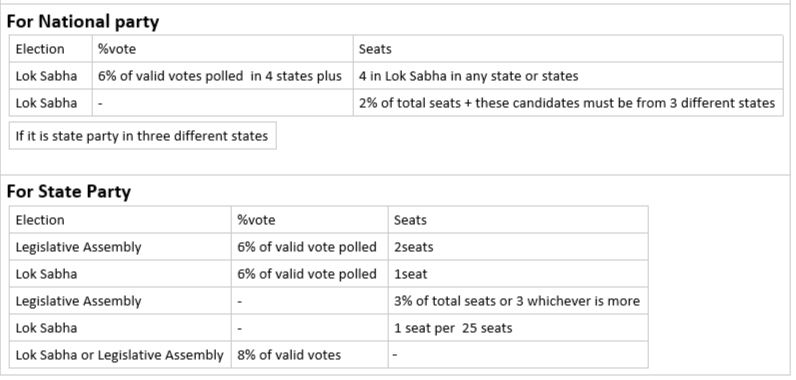Table of Contents
Political Parties
What is Political Party?
Voluntary association or organised group of individuals who share same political view and try to gain political power through constitutional means and who desire for promoting national interests of country.
Features of Party System in India ?
- Multi party system because of its continental size ,diversified society, adoption of universal adult franchise
- Most of time in history dominated by one party ie Congress. Hence, called Congress system
- Except for CPI,CPM & BJP no other party has clear ideology than to grab power
- Parties are organised around an eminent leader who become more important than ideology of party like Nehru & Indira Gandhi -Congress, NT Rama Rao- AIADMK
- Large number of parties are based on religion, caste, language , culture, race so on
- Emergence of large number of regional parties especially after internal emergency of 1975 has led to coalition politics at center
- Practice of defection gained greater currency after fourth (1967) general elections and caused great instability to governments at state & central level
- Effective Opposition is very important for democratic government but most of time with clear majority of Congress, India never had an effective opposition. But situation completely reversed now
Issues with Political Parties in India
- Lack of Internal Democracy – tendency to keep power concentrated at the top and elections for administrative posts aren’t held .
- Dynastic successions – Political parties run like family fiefs
- Growing role of money and muscle power in parties
Recognition of parties
Who has power to recognise Political Parties ?
Election Commission of India
Why Parties Want Recognition ?
- Unique symbol across country
- Free airtime on public broadcasters AIR and Doordarshan during the Lok Sabha elections.
- Two free copies of electoral rolls
- Their candidates need only one proposer to file their nomination papers.
- Deploy 40 star campaigners whose expenditure is not clubbed with the election expenses of an individual candidate.
Criteria by which National and State Parties are recognised ?

National parties in India
Presently 7 but keep on changing from time to time
| BJP | Lotus |
| CPI (M) | Hammer ,Sickle & Star |
| CPI | Hammer and Sickle |
| Indian National Congress | Hand |
| Bahujan Samaj Party | Elephant |
| NCP | Clock |
| Trinamool Congress (Newest Entry) | Jora Ghas Phul |
Issue : Should political Parties be under Ambit of RTI
History
| 2013 | Central Information Commission declared that – Six national parties to be public authorities under RTI Act – Directed them to appoint Public Information Officers |
| August 2013 | Government introduced a Right To Information (Amendment) Bill which removed political parties from the scope of the law. |
Parties should be under the purview of RTI (ie Whether they are Public Authority)
- They should
be included because
- Parties receive substantial financing from government in form of subsidies , tax exemptions & benefits
- Given free time on Government controlled media
- Given land in prime areas at very low rates for establishment of office
- Political parties indirectly make laws and shape public policy. Hence, they should be transparent
- For fighting Corruption and making them accountable : To breaking nexus of Political Parties & Corporate Houses
Why Parties object
- Main excuse given by Political Parties : minutes of internal meetings of a political party cannot be made public.
- Political parties are responsible under Representation of People Act and submit details of their expenses to Election Commission of India & income tax authorities
Above objection can easily be dealt with by suitable exemptions . The real fear is exposure of their finances . Parties are fighting to keep this a secret, fighting for their very survival as they see it.
Issue : Inner Party Democracy in Political Parties
Unlike some countries like Germany and Portugal, India has no legal provision for enforcing internal democracy in a political party
In India , without any exception , almost no political party has inner party democracy . To take few examples
| Congress | – Domination of the Nehru-Gandhi family – Rahul Gandhi= sixth member from the family to occupy the top post |
| BJP | – There has been no contest for the president’s post – Selection of the party president in the BJP is guided by RSS |
Points in favour of Inner Party Democracy
- Ideological Arguments : Parties which are fighting to ensure democracy in the country should be democratic in their internal working as well.
- Increases accountability and promote transparency (especially in using Party Funds)
- Helps in dismantling of nepotism & dynasty politics
- It would give space for dissent within the party reducing the possibility of formation of number of off shoots of political parties
- Cultivate a sense of ownership for local politician
- 2nd Administrative Reforms Commission (ARC) speaks about corruption due to high centralization
Way forward
- There is a need for a comprehensive law that deals specifically with inner party democracy.
